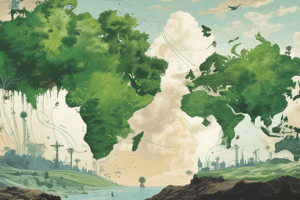Podcast
Questions and Answers
What is the core practice or theory of politics?
What is the core practice or theory of politics?
- Encouraging isolation from the community
- Influencing other people through control over resources or power (correct)
- Following decisions made by a single person
- Avoiding any form of decision-making
How is democracy defined in terms of government power?
How is democracy defined in terms of government power?
- Vested in the hands of a single ruler
- Vested in the hands of foreign leaders
- Vested in the hands of a selected elite group
- Vested in the hands of the people (correct)
What are key characteristics of democracy?
What are key characteristics of democracy?
- Rule of a single leader, limited voting rights, suppression of freedoms
- Rule of a small minority, restricted civil rights, controlled media
- Rule by external forces, no voting rights, no freedom of expression
- Rule of the majority, fair and free elections, civil liberties (correct)
In democracy, who has the right to participate in the decision-making process?
In democracy, who has the right to participate in the decision-making process?
What distinguishes direct democracy from representative democracy?
What distinguishes direct democracy from representative democracy?
Why are civil liberties considered essential in a democratic society?
Why are civil liberties considered essential in a democratic society?
What is the purpose of dividing government institutions into distinct branches?
What is the purpose of dividing government institutions into distinct branches?
In a first-past-the-post (FPTP) electoral system, how is a seat in a constituency typically won?
In a first-past-the-post (FPTP) electoral system, how is a seat in a constituency typically won?
What is the main objective of proportional representation (PR) electoral systems?
What is the main objective of proportional representation (PR) electoral systems?
How do elected representatives in legislative bodies reflect the will of the people?
How do elected representatives in legislative bodies reflect the will of the people?
Which factor may hinder an accurate representation of people's will in democratic elections?
Which factor may hinder an accurate representation of people's will in democratic elections?
Why may democracy be considered not conducive to rapid decision-making during crises?
Why may democracy be considered not conducive to rapid decision-making during crises?
Flashcards are hidden until you start studying
Study Notes
Politics and Democracy: Foundations and Key Concepts
In the realm of human interactions, the concepts of politics and democracy intersect to shape our social and civic lives. Politics, at its core, is the practice or theory of influencing other people, typically through the exercise of control over resources or the distribution of power within a given community. Democracy, on the other hand, is a form of government in which power is vested in the hands of the people, who have the right to participate in the decision-making process.
Origins and Characteristics of Democracy
The earliest traces of democracy originated in ancient Athens, where citizens could participate in political decision-making through direct voting and assemblies. Fast forward to the modern era, democracy has evolved into various forms, from direct democracy to representative democracy, which is more common in contemporary societies.
Key characteristics of democracy include:
- Rule of the majority: Decisions are made by the majority, with the minority retaining the freedom to dissent, but not to block the decisions.
- Fair and free elections: Citizens have the right to vote for representatives or leaders who will govern on their behalf.
- Civil liberties: Citizens are granted rights to free speech, assembly, and the press, which are essential for an informed and engaged populace.
- Separation of powers: Government institutions are divided into distinct branches, such as the legislative, executive, and judicial branches, to prevent any one branch from becoming too powerful.
Democracy in Action: Electoral Systems and Representative Bodies
Democratic societies operate within various electoral systems, such as first-past-the-post (FPTP), proportional representation (PR), and hybrid systems. FPTP is a "winner-takes-all" system, where the candidate with the most votes in a particular constituency wins a seat, regardless of the overall vote share. PR systems, on the other hand, aim to ensure that the distribution of seats in a legislative body reflects the distribution of popular votes.
Parliaments, congresses, and other legislative bodies are comprised of elected representatives who reflect the will of the people and are responsible for enacting laws, controlling government budgets, and scrutinizing the actions of the executive branch. Leaders of democratic governments are also elected, either directly or indirectly, and are held accountable to their constituents through the democratic process.
Challenges and Limitations of Democracy
Democracy is not a perfect system, and it faces numerous challenges and limitations. For instance, the electoral process may not accurately represent the will of the people due to voter apathy, voter suppression, or the influence of money in politics. Moreover, democracy is not always conducive to rapid decision-making, especially in times of crisis or conflict.
Additionally, some argue that democratic systems may be vulnerable to manipulation and exploitation, as they can create opportunities for special interests to influence the political process. Furthermore, the effectiveness of democracy may be influenced by factors such as education, income levels, and the media landscape.
Conclusion
Despite its challenges and limitations, democracy remains a powerful and resilient form of government. By upholding the principles of fairness, equality, and participation, it fosters an environment in which citizens can actively shape their collective future. Politics, in turn, serves as the vehicle for the implementation of democratic principles, ensuring that the voices of the people are heard and their rights protected.
As we navigate the complexities of modern society, it is essential to remain informed, engaged, and committed to upholding the values of democracy. Only by working together can we ensure that democracy continues to evolve and flourish, strengthening our communities and improving the lives of individuals everywhere.
Studying That Suits You
Use AI to generate personalized quizzes and flashcards to suit your learning preferences.




